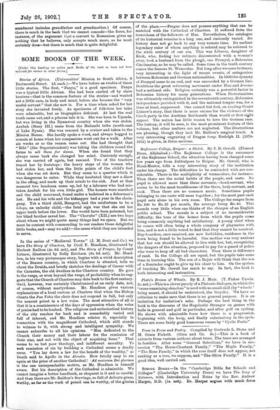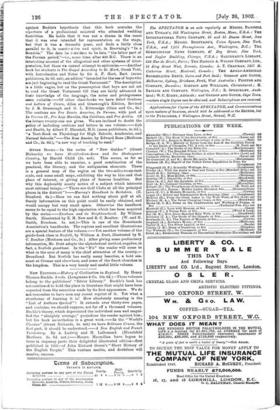against Budde's hypothesis that this book contains the repertoire of
a professional minstrel who attended wedding festivities. He holds that it was not a drama in the sense that it was ever intended for representation on the stage, but that it was a dramatic poem, and finds a fairly close parallel to it, in constriction and spirit, in Browning's "In a Gondola." The date he considers to be late, " the latter part of the Persian period,"—i.e., some time after 400 B.C. There is en interesting account of the allegorical and other systems of inter- pretation, but these we cannot attempt to epitomise.—Another book for students is The Gospel According to St. Mark, Greek Text, with Introduction and Notes by Sir A. F. Hort, Bart. (same publishers, 2s. 6d. net), an edition "intended for the use of boys who are just beginning to read the Greek Testament." The description is a little vague, but on the presumption that boys are not set to read the Greek Testament till they are fairly advanced in their knowledge of the language, the notes and prolegomena seem suitable.—Of other class-books we have Select Orations and Letters of Cicero, Allen and Greenough's Edition, Revised by J. B. Greenough and G. L. Ritteredge (Ginn and Co., 6s.) The orations are Pro Roscio Amerino, In Verrem, with part of In Verrem II., Pro Lege Manilia, the Catilines, and Pro Archia. Of the letters twenty-one are given. We are inclined to doubt the policy of including orations and letters in one volume.—Life and Health, by Albert F. Blaisdell, M.D. (same publishers, 4s.6d.), "a Text-Book on Physiology for High Schools, Academies, and Normal Schools."—The Ross Reader, by Edward Rose (Methuen and Co., 2s. 6d.), "a new way of teaching to read."







































 Previous page
Previous page